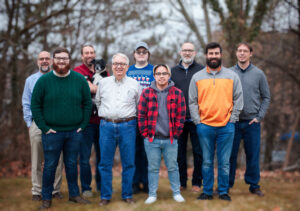The Hiring Dilemma: Senior Engineers or Recent Graduates
What both young and senior engineers must embrace to bridge the gap.
This article isn’t about age. It’s about experience. Because, the truth is, when you are hiring, you may need to choose between someone who has some and someone who doesn’t.
Any competent and growing engineering firm is looking for the best of both worlds. We need fresh faces with new ideas. And we need experience. Together we are stronger.
If you are a young engineer, with a degree in hand, you’ve got a lot to learn. But don’t let that keep you from applying to the best firms. Strong, growing engineering firms, like TTR Engineers in Akron, have a lot to teach!
If you’re a seasoned veteran, then you already know the benefits of staying relevant, and constantly learning the new engineering landscape. But is there something else you can do to become a more critical component of your firm’s future and success?
How Senior and New Engineers Can Differ and Improve
1. Recent Technical Fluency:
Let’s start with the obvious. Fresh out of college, young engineers are well-versed in the latest technologies and methodologies. Senior engineers know their stuff, but it’s been a long time since they were in school. A competent engineering firm will create a culture that encourages collaboration.
2. Adaptability and Open-mindedness:
Young engineers and senior engineers can be set in their ways. One because of what they think. The other is because of what they know to be true. But young engineers, if flexible, can learn innovative problem-solving approaches. Senior engineers can leverage this advantage by being open to learning, and by being willing to teach.
3. Enthusiasm:
Youthful exuberance often translates into high levels of energy. Young engineers are eager to prove themselves. Senior engineers may not be bouncing off of walls, but they value excellence. Experience and enthusiasm can be built together.
What Senior Engineers and Younger Engineers Must Have in Common:
1. Continuous Learning:
Just out of school doesn’t mean you are done learning. And, the seasoned professional must stay on top of rapidly evolving technical environments. Young engineers can suggest new skills and instructional forums. Senior engineers can incorporate new skills with tried and true results.
2. Mentorship and Knowledge Transfer:
Senior engineers play a crucial role in guiding and mentoring younger colleagues. AT TTR Engineers, we feature a Career Pathway that encourages growth at all levels. Whether you are just starting out or have been a long-term standout, there is a place here for you to begin and grow.
3. Embrace Innovation:
Young engineers are valuable to a growing engineering organization. We encourage experimentation, supporting new ideas, and creating an environment where learning from failure is valued. Senior engineers can lead by example and learn new methods at the same time. Everyone wins.
The difference isn’t about age. It’s about experience and generational aptitudes. Growing engineering firms need the best of both worlds in engineering today. If you’re a young engineer, looking for a break with a growing structural engineering firm, consider TTR Engineers. We’re looking for the best and we’re growing. Let’s grow together.








 Choices are everywhere.
Choices are everywhere.


